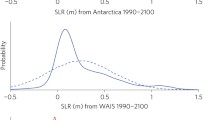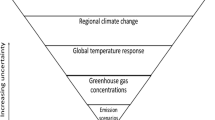Abstract
It is usually necessary to apply incomplete and uncertain information to inform policy and decision making, creating the need to characterize the state of knowledge and identify when more certain information may be available. After all, some information is better than none and conversely, even perfect information is of no use if it is available only after a decision has been made. In scientific assessments for global change, the challenges are particularly acute because of scientific complexity, long time horizons, and large political and economic stakes, among other factors. Moss and Schneider prepared uncertainty guidelines for the Third Assessment Report (TAR) of the Intergovernmental Panel on Climate Change (IPCC) that recommended a process to make expert judgments of levels of confidence and uncertainty more systematic and transparent. The guidance provided calibrated uncertainty terms to improve communication of findings to users and urged preparation of a traceable account of the authors’ assessment of the evidence for each major finding. This article reviews the recommendations and their effectiveness and highlights ensuing critiques and the evolution of uncertainty guidance for subsequent assessment reports. It discusses emerging challenges in providing science for decision making in the era of increasing model resolution and complexity and burgeoning interest in information to inform adaptation and mitigation at regional and finer scales.



Similar content being viewed by others
Notes
Approaches to evaluating and communicating uncertainty in expert-judgment based scientific assessments are a small subset of quantitative and qualitative approaches to uncertainty quantification, propagation and characterization applied to evaluating uncertainties in research and analysis. Uncertainty characterization and communication is essential to ensure that a scientific conclusion represents a valid and defensible insight. This article does not address this broader set of approaches for evaluating uncertainty in the science of complex systems.
In the frequentist statistical approach, probability is defined as the relative frequency that something would occur in a limitless number of independent, identical trials. In practice, random sampling or other thought experiments are used since there are relatively few phenomena that can be expected to occur in an infinite, independent, and identical fashion. A Bayesian approach involves a rigorous mathematical methodology for evaluating the probability of an event conditional on the available information, interpreted as degree of belief, which is updated as new evidence becomes available.
References
Agrawala S (1998a) Context and early origins of the intergovernmental panel on climate change. Clim Chang 39:605–620
Agrawala S (1998b) Structural and process history of the intergovernmental panel on climate change. Clim Chang 39:621–642
Allen M, Raper S et al (2001) Uncertainty in the IPCC’s third assessment report. Science 293:430–433
Allen MR, Booth BB et al (2004) Observational constraints on future climate: distinguishing robust from model-dependent statements of uncertainty in climate forecasting. IPCC Risk and Uncertainty Workshop, Maynooth, Ireland
Budescu DV, Broomell S et al (2009) Improving communication of uncertainty in the reports of the intergovernmental panel on climate change. Psychol Sci 20:299–308
CCSP (2009) Best practice approaches for characterizing, communicating, and incorporating scientific uncertainty in decisionmaking. A report by the climate change science program and the subcommittee on global change research. M. G. Morgan, H. Dowlatabadi, M. Henrionet al. Washington, DC, National Oceanic and Atmospheric Administration: 96
CIA (1964) Words of estimative probability. Studies in intelligence. Washington, DC, Central Intelligence Agency: 12
Dessai S, Hulme M (2004) Does climate adaptation policy need probabilities. Climate Policy 4:107–128
Funtowicz SO, Ravetz JR (1990) Uncertainty and quality in science for policy. Kluwer, Dordrecht, 229 pp
Giles J (2002) Scientific uncertainty: when doubt is a sure thing. Nature 418:476–478
Grubler A, Nakicenovic N (2001) Identifying dangers in an uncertain climate. Nature 412:15–15
Ha-Duong M (2003) Imprecise probability bridges scenario-forecast gap. Pittsburgh, PA, 15 pp
Hall J, Fu G et al (2007) Imprecise probabilities of climate change: aggregation of fuzzy scenarios and model uncertainties. Clim Chang 81:265–281
Hawkins E, Sutton R (2010) The potential to narrow uncertainty in projections of regional precipitation change. Climate Dynamics: 1–12
IAC (2010) Climate change assessments: Review of the processes and procedures of the IPCC. InterAcademy Council, Amsterdam
IPCC (2001a) Climate change 2001: The scientific basis. Contribution of working group I to the third assessment report of the intergovernmental panel on climate change. Cambridge University Press, Cambridge, England
IPCC (2001b) Climate change 2001: Impacts, adaptation, and vulnerability. Contribution of working group II to the third assessment report of the intergovernmental panel on climate change. Cambridge University Press, Cambridge, England
IPCC (2001c) Climate change 2001: Mitigation. Contribution of working group III to the third assessment report of the intergovernmental panel on climate change. Cambridge University Press, Cambridge, England
IPCC (2001d) Climate change 2001: Synthesis report. Contribution of working group I, II, and III to the third assessment report of the intergovernmental panel on climate change. Cambridge University Press, Cambridge, England
IPCC (2005) Guidance notes for lead authors of the IPCC fourth assessment report on addressing uncertainties. Intergovernmental panel on climate change, Geneva
IPCC (2007) Contribution of working group I to the fourth assessment report of the intergovernmental panel on climate change. Cambridge University Press, Cambridge United Kingdom and New York, NY, USA
Kriegler E, Held H (2005) Utilizing belief functions for the estimation of future climate change. Int J Approx Reason 39:185–209
Lempert R, Schlesinger ME (2001) Climate-change strategy needs to be robust. Nature 412:375
Manning MR (2003) The difficulty of communicating uncertainty. Clim Chang 61:9–16
Manning MR, Petit M (2003) A concept paper for the AR4 cross cutting theme: uncertainties and risk. Geneva, Intergovernmental Panel on Climate Change: 14
Mastrandrea MD, Field CB et al (2010) Guidance note for lead authors of the IPCC fifth assessment report on consistent treatment of uncertainties. Intergovernmental Panel on Climate Change, Geneva
Min S-K, Simonis D et al (2007) Probabilistic climate change predictions applying Bayesian model averaging. Philosophical Transactions of the Royal Society A: Mathematical. Physical and Engineering Sciences 365:2103–2116
Morgan MG (1998) Uncertainty analysis in risk assessment. Human and Ecological Risk Analysis 4(1):25–39
Morgan MG, Henrion M (1990) Uncertainty: a guide to dealing with uncertainty in quantitative risk and policy analysis. Cambridge University Press, Cambridge; New York
Morgan MG, Keith DW (1995) Subjective judgments by climate experts. Environ Sci Technol 29:468–476
Moss RH, Schneider SH (2000) Uncertainties in the IPCC TAR: Recommendations to lead authors for more consistent assessment and reporting. Cross-cutting issues in the IPCC Third assessment report. R. Pachauri, and Taniguchi, T. Tokyo, Global Industrial and Social Progress Research Institute for IPCC,pp 33–52
Nature (2010) Validation required. Nature 463:849
NDU (1978) Climate change to the year 2000. National Defense University, Washington DC
NIC (2007) Iran: nuclear intentions and capabilities. N. I. Council. Washington, DC: 9
Nordhaus WD (1994) Expert opinion on climatic change. Am Sci 82:45–51
Oppenheimer M, O’Neill BC et al (2007) The limits of consensus. Science 317:1505–1506
Patt A (2007) Assessing model-based and conflict-based uncertainty. Glob Environ Chang 17:37–46
Patt A, Dessai S (2005) Communicating uncertainty: lessons learned and suggestions for climate change assessment. Comptes Rendus Geosciences 337:425–441
Patt AG, Schrag DP (2003) Using specific language to describe risk and probability. Clim Chang 61:17–30
Petersen AC (2006) Simulating nature: a philosophical study of computer-simulation uncertainties and their role in climate science and policy advice. Ph.D Dissertation, Vrije Universiteit, 220 pp
Pidgeon N, Fischoff B (2011) The role of social and decision sciences in communicating uncertain climate risks. Nature Clim Change 1:35–41
Pittock AB, Jones RN et al (2001) Probabilities will help us plan for climate change. Nature 413:249–249
Politi MC, Han PKJ, et al (2007) Communicating the uncertainty of harms and benefits of medical interventions. Medical Decision Making (Sep-Oct):681–695
Reilly J, Stone PH et al (2001) Uncertainty and climate change assessments. Science 293:430–433
Risbey J, Kandlikar M (2007) Expressions of likelihood and confidence in the IPCC uncertainty assessment process. Clim Chang 85:19–31
Schneider SH (2001) What is ‘dangerous’ climate change? Nature 411:17–19
Swart R, Bernstein L et al (2009) Agreeing to disagree: uncertainty management in assessing climate change, impacts and responses by the IPCC. Clim Chang 92:1–29
Titus JG, Narayanan VK (1995) Probability of sea level rise. Environmental Protection Agency, Washington DC, 186 pp
USGCRP (2000) US national assessment of the potential consequences of climate cariability and change. US Global Change Research Program, Washington DC
Author information
Authors and Affiliations
Corresponding author
Additional information
The author is Senior Staff Scientist at Pacific Northwest National Laboratory’s Joint Global Change Research Institute at the University of Maryland. He dedicates this article to the memory of Stephen H. Schneider, the captain of the “uncertainty cops”. He also acknowledges with gratitude PNNL colleagues Jennie Rice, Michael Scott, and Stephen Unwin, whose knowledge and ideas have given shape to a number of recommendations in this article. He also thanks Elizabeth Malone, Granger Morgan, Nathan Engle, and Caroline Boules for comments on an earlier draft.
Rights and permissions
About this article
Cite this article
Moss, R.H. Reducing doubt about uncertainty: Guidance for IPCC’s third assessment. Climatic Change 108, 641 (2011). https://doi.org/10.1007/s10584-011-0182-x
Received:
Accepted:
Published:
DOI: https://doi.org/10.1007/s10584-011-0182-x




